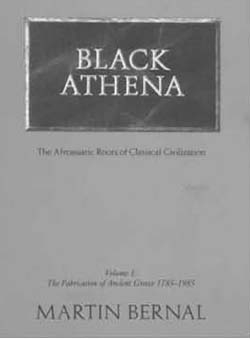For several years I taught a history course on ‘Social Formations and Cul- tural Patterns of the Ancient and Medieval World’ at Hans Raj College, University of Delhi. This was a B.A. Honours ‘survey’ course (which is still part of the syllabus, although in a modified form), intended to give to students a general understanding of the early and premodern history of humankind—including themes such as evolution, transition to food production, the Sumerian civilization, ancient Egypt, Graeco-Roman antiquity, and emergence of feudalism in early medieval Europe. While teaching this course I became acquainted with a work of brilliant scholarship, Martin Bernal’s Black Athena: The Afroasiatic Roots of Classical Civilization (Volume I, 1987). The book was lent to me by the well-known lawyer and crusader for secularism, Anil Nauriya, who was rather annoyed when I told him that I had taken the liberty of getting some portions photocopied. It was much later that I came to possess a personal copy of the book. I have profited much from re-reading the work from time to time. Surprisingly, in India this major academic intervention in historiography has not received the kind of attention that it deserves, the more so as it has much to tell us about the manner in which colonial dominance has fundamentally re-shaped the understanding of the ancient human past and the role which ideas of race have played in this process. However, many of the conclusions of the book were too radical to be directly incorporated into classroom teaching.
The book argues that ancient Greek civilization bore the strong imprint of Egyptian civilization and of cultures of West Asia and the Eastern Mediterranean (e.g., of the Canaanites/Phoenicians). This was recognized by the ancient Greeks; and European historiographical traditions continued to acknowledge these influences till the beginning of the modern era. By the end of the eighteenth century an ‘Aryan Model’ had replaced this understanding, and the role of Egypt and West Asia in the making of Europe began to be systematically erased in the dominant historiography which just could not accept the Egyptian or Phoenician ancestry of ancient Greece. Black Athena is primarily a powerful critique of racist perceptions of the past. With the ascendancy of colonial ideas about Aryan superiority, Egyptians and Semites were downgraded. In the latter half of the nineteenth century and the early twentieth century an ‘Extreme Aryan Model’ prevailed, reaching its most perverted form in Nazi Germany. This model condemned Egyptians and Semites to complete obscurity in terms of their historical relationship with classical Greece. How could dark-complexioned Egyptians, or linguistically inferior Semitic Phoenicians (=Jews) be the ultimate source of European civilization? After all, the distinctive characteristics which defined Europe could be traced back to the achievements of classical Greece: these were the achievements of a racially superior people, linguistically Indo-European and racially Aryan. It is worth bearing in mind that a social formation, with features of what historians recognize as a ‘civilization’ (surplus production; urbanization; writing; a ruling class that appropriates the surplus; the presence of a state) had emerged in Egypt by about 3000 BCE (the Great Pyramid was built around 2500 BCE), whereas the Classical Age of ancient Greece began in c. 500 BCE.

